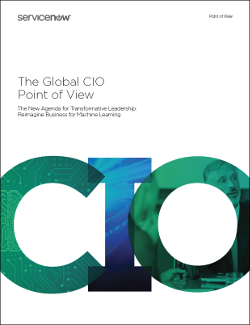Ungated Post | 08 Nov 2017
The Global CIO Point of View

We partnered with ServiceNow to survey 500 Chief Information Officers around the world and across industries. Our survey explored the strategies CIOs are adopting to realize value from machine learning, and the competitive advantage for organizations that are advancing to decision automation.
Machine learning has arrived in the enterprise, and companies are eager to reap the competitive benefits the technology can provide. From automating processes that enable faster business operations to applying algorithms to improve accuracy, CIOs are adapting the technology for a wide variety of uses—and transforming the way we work.
To investigate the rise of machine learning, we worked with ServiceNow to conduct a survey of 500 CIOs in 11 countries on three continents and across 25 industries, alongside in-depth interviews with leaders in the field. We found that CIOs are increasing their investment in machine learning, but must overcome several barriers to achieve their productivity, revenue, and innovation goals. Unless CIOs turn their attention to updating not just technology, but talent and business processes, the full value of machine learning cannot be realized.
Oxford Economics’ team is expert at applying advanced economic tools that provide valuable insights into today’s most pressing business, financial, and policy issues.
To find out more about our capabilities, contact:
Americas
Diantha Redd
+1 (646) 503 3052
Email
Asia Pacific
Peter Suomi
+65 6850 0110
Email
EMEA
Aoife Pearson
+44 (0)203 910 8054
Email
Related Services

Post
KPMG M&A Outlook 2026: Between Uncertainty, Resilience, and Seizing Opportunities
Discover how Germany’s M&A landscape is evolving – with a focus on growth, AI and post-merger value creation.
Find Out More
Post
Silver, the next generation metal
This report highlights the critical role silver plays in data centres and artificial intelligence (AI), automotive and electric vehicles (EVs), and solar energy photovoltaics (PVs). With these sectors expected to expand significantly over the coming years, we expect future silver demand to be strong.
Find Out More
Post
Powering the UK Data Boom: The Nuclear Solution to the UK’s Data Centre Energy Crunch
The UK’s data centre sector is expanding rapidly as digitalisation, cloud computing, and artificial intelligence (AI) drive surging demand for high-performance computing infrastructure.
Find Out More